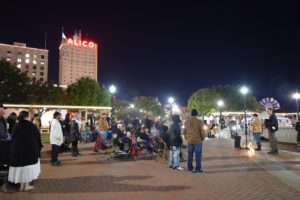By Diego Loredo
It’s almost 2016 and it’s about that time of year where everyone starts to think of some New Year’s resolutions. I personally don’t make any because I usually don’t end up sticking to them, but this time it’s different. These are really my own personal New Year’s resolutions for college but some of them (or all of them) can apply to other students in college.
The struggle has been real this semester. I moved into an apartment and took tougher classes. The fact that I was in an apartment meant that I didn’t have the luxury of being on campus. That resulted in me, more often than I should have, skipping class because I didn’t want to drive or take the bus to campus. My grades also went down a bit because of the tougher classes I took. So I decided that I would create several New Year’s resolutions that I would, hopefully, stick too for my 2016 spring and fall semesters.
Don’t take 8 am classes!
This semester I learned just how hard going to 8 am classes can be. I am not a morning person and waking up at 7 to get ready for my 8 am classes was harder than I thought it would be. I took one my first semester, but I was living on campus so that made it easier to go to class. However, this semester I was in an apartment that was 15 minutes away from campus. Because of that, I would often choose to sleep in (which resulted in my grades going down). Unless you have to or you’re a morning person, I would avoid taking 8 am classes.
Save money
It doesn’t have to be a lot at once, but it would help to have a little savings in case of any emergencies. Maybe put in $10 or $20 a week. It doesn’t sound like much but eventually it’ll add up. This will come in handy whenever something comes up. My car broke down earlier this year and I had no money saved up that I could use to pay for it. I ended up borrowing money from my mom, which I later paid back. Let’s face it, we’re always going to run into something unexpected. Having some money saved up will be a huge help.
Work out more
I definitely need to do this. I gained weight my first three semesters and really am not as fit as when I was in high school. I worked out for a bit my second semester but then stopped. I play soccer every now and then but that isn’t enough to get back in shape. So next semester I’m going to try to work out more. Working out can also be a good stress reliever for college students. Lifting weights or going for a run can help free your mind from any worries. Eating healthier can also make you more productive throughout the day.
Step out of your comfort zone
Yes I know, everyone says this, but it’s true! We all need to do this. I never really did that my first three semesters and I need to change that. For others, this can mean attending events on campus, joining new organizations, or just introducing yourself to others on campus or in class. For me, it’s going to the gym to work out more. Like I said before, this is something I need to do. The more I do it, the quicker I become comfortable going.
Don’t procrastinate!
This will be the most difficult New Year’s resolution for me. I love to push things off until the last minute. Instead of writing that essay that’s due in a few days, I would just take a nap. This is a really bad habit of mine and I’m sure it’s the same for other college students. We all procrastinate, but we can also control it. Now I’m not saying to finish your work the day it’s assigned. Start out small, plan to finish your assignment a week or a couple days before it’s due to allow some time to look over it and make sure you can turn in your best work. It’s okay to procrastinate a little every now and then, but I need to try to keep it to a minimum.
I’ll be honest, I hate New Year’s resolutions. I never stick to them and I think they’re a waste of time. But this time, I figured that I would give it another try. I think the reason why most people don’t stick to their resolutions (myself included) is because we all make these unrealistic goals for ourselves that we usually give up on a week into the New Year. I think that these resolutions that I made are realistic enough for a guy like me to achieve, and hopefully for others to achieve as well. No matter what your New Year’s resolutions are, hopefully you’ll stick to them throughout the year! Merry Christmas and Happy New Year!
 Diego Loredo is a sophomore at the University of North Texas. He is majoring in public relations. He graduated from University High School in 2014. Although he is still not quite sure what exactly he wants to do, he thinks he wants to work somewhere in sports PR (preferably soccer or college football). His hobbies include playing soccer and golf. He is 19 years old.
Diego Loredo is a sophomore at the University of North Texas. He is majoring in public relations. He graduated from University High School in 2014. Although he is still not quite sure what exactly he wants to do, he thinks he wants to work somewhere in sports PR (preferably soccer or college football). His hobbies include playing soccer and golf. He is 19 years old.
The Act Locally Waco blog publishes posts with a connection to these Aspirations for Waco. If you are interested in writing for the Act Locally Waco Blog, please email [email protected] for more information.
by Kaleigh Huser
As a junior in high school, I am sorting through those “next step” questions about what type of career I will pursue and where I will attend college. When I was younger, I wanted to be a teacher; I also considered marine biology. As of today, I have abandoned the idea of becoming a professional violinist, but you never know. I very much enjoy theatre and music, and while I can’t say for sure where my interests will lead, I know that I am going to college. I have always known that even if it means drowning in student loans… college is my future. Thanks to Waco voters, I don’t have to worry as much about the student loans. With the approval of the Tax Ratification Election (TRE) I can enroll in classes that will allow me to earn college credit while in high school at no cost to me or my mother.
Prior to this year, high school juniors and seniors were limited to two dual credit classes per semester. The Texas Legislature passed new laws that lifted the limits on the number of dual credit classes a high school student can take and opened up dual credit for underclassmen. This means that incoming freshmen can even get an associate’s degree while in high school should they chose to do so.
I like the structure of the dual credit classes. Expectations are clear, and we are getting experience with college systems. I use Blackboard for notes, grades, handouts, projects, and pretty much everything. I don’t use my planner anymore, because it is all on my phone. When I am talking to my friends who go to school at University of Texas, it feels good to know that I am doing a lot of the same things that they are. When I get there, I will be better prepared thanks to the dual credit experience.
While some high school students qualified for a tuition waiver, my family and many others paid the full MCC tuition. Financial aid is not available for high school students, so taking a full slate of courses can become very expensive over the four years of high school. Next year, I plan to take three to four dual credit classes each semester, which will equal almost three thousand dollars over the school year. With the tuition waiver for all Waco ISD students, I can take the classes without worrying about the financial pressure, and I will enter college with 24 to 30 hours already paid for. If I go to UT, a year of tuition is $9, 346. We are so blessed to have this opportunity! I have friends who do not attend school in Waco ISD, and they are attending the same dual credit classes that I am. They are responsible for tuition, which sometimes limits their options.
If you voted to have your taxes raised or worked to get the TRE passed, thank you for your generosity. I am not just speaking for myself when I say we are honored that you recognized our potential and voted to invest in our future.
 Kaleigh Huser is a junior at Waco High School. She is an active member of the Theatre Company, Show Choir, A Capella choir, National Honor Society, and Advanced Academics Student Advisory Board and she plays the violin. Kaleigh is ranked among the top five students in her class, and she spends every waking hour at Waco High or working on projects for classes at Waco High.
Kaleigh Huser is a junior at Waco High School. She is an active member of the Theatre Company, Show Choir, A Capella choir, National Honor Society, and Advanced Academics Student Advisory Board and she plays the violin. Kaleigh is ranked among the top five students in her class, and she spends every waking hour at Waco High or working on projects for classes at Waco High.
The Act Locally Waco blog publishes posts with a connection to these aspirations for Waco. If you are interested in writing for the Act Locally Waco Blog, please email [email protected] for more information.
by Jim Coston
(Note: This is Part 3 in a series on Pay Day lending and its effect on our Waco community. For the rest of the series, click here: Pay Day Lending in Waco. — ABT)
I had the privilege of serving as a City Councilman in Trenton, New Jersey, prior to coming to Waco. Despite what the national media may portray, the real action is in local politics. It is here that good government can offer immediate relief to citizens, foster opportunity and right wrongs. I believe the proposed ordinance to provide common sense regulation to the predatory lenders in Waco (also known as payday and auto-title lenders) will do all three.
As a former politician who drafted and passed legislation, I know that every ordinance produces unintended consequences. This is a given. And proponents like myself will bear some responsibility to respond to those unforeseen repercussions. Absolutely.
The fear of unintended consequences should not hinder or prevent our leaders from governing with purpose, that is from legislating intended consequences. It is these intended consequences that deserve some attention.
There are many fine details to the ordinance. I read it as having three main benefits for Waco and its citizens. The first requires each payday or auto-title lender to register with the City and to provide the names of its owners. This may seem a small matter; however, transparency is not one of the hallmarks of this industry. Knowing who is operating where can only serve the public good.
The second benefit concerns terms of lending offered to consumers. Payday lenders may not lend more than 20% of a consumer’s gross monthly income; auto-title lenders may not lend more than 70% of the value of an automobile. This provision should keep consumers from getting over-extended and stuck in a cycle of increasing debt. Furthermore, 25% of all payments must go towards reducing principals. Typical predatory lending practices keep the principal intact even as customers pay more and more in monthly fees. Those fees increase and accelerate, leaving the principal intact.
The third benefit requires these lenders to provide customers with information on available consumer credit counseling. Emergencies happen. People get sick. Cars need repairs. Unexpected expenses arise. There is a need among a portion of Waco citizens for access to capital on short notice. Predatory lenders provide this…service. Consumer credit counselors can do the same, with far less short and long term pain.
When this ordinance passes—I have faith in our municipal leaders—predatory lenders will still make a profit. Well and good. Waco citizens will still have access to quick capital. Well and good. But Wacoans will have options and far more favorable terms.
For some background on this industry, its origin, business model, connections to big banks as well as oft-cited talking points from predatory lending proponents, I refer you to Broke U.S.A. by Gary Rivlin. Be forewarned, it requires a strong stomach; the author provides in excruciating detail how this industry preys upon the poor, downtrodden and most vulnerable in society.
I have the privilege of serving as the Senior Pastor of Calvary Baptist Church located at 18th and Bosque in the Sanger-Heights neighborhood of Waco. Calvary is located only a few blocks from Waco Drive; and thus, only a few blocks from multiple predatory lending establishments. I come at this issue not from political or social concerns. I care about this matter because of my faith in and following of Jesus Christ. Karl Barth, the pre-eminent theologian of the 20th century, noted that the confession “Thy kingdom come” is the most radically political statement one can make. God’s kingdom will not have a place for payday or auto-title lending. It will have ample supply of mercy, grace and justice.
For some background on the divine abhorrence of usury, I refer you the Bible. With only slight exaggeration, you would be hard pressed to find a page within the sacred writ that does not speak of God’s protection over the poor, downtrodden and those most vulnerable in society, and corresponding judgment upon predators and those who do not seek their safety and justice alike. That protection is not reserved for some far off time or far off place. Followers of God are called to work for the redemption of those in need, and their predators, here and now. Passage of this ordinance is one means of declaring “Thy kingdom come!”
 Jim Coston is Pastor to Calvary Baptist in Waco, husband to Julie, dad to Justin, Chloe and Samantha and ranch hand to his family’s chickens, goats and dogs.
Jim Coston is Pastor to Calvary Baptist in Waco, husband to Julie, dad to Justin, Chloe and Samantha and ranch hand to his family’s chickens, goats and dogs.
The Act Locally Waco blog publishes posts with a connection to these aspirations for Waco. If you are interested in writing for the Act Locally Waco Blog, please email [email protected] for more information.
By Meilana Charles
(Note: This post is a part of “Dine on 3,” a new initiative through Prairie View A&M University Cooperative Extension Program. Dine on 3 will use social media outlets to encourage family units to prepare and share home cooked meals more regularly. The initiative’s objectives are to encourage home cooked family meal consumption more frequently and to communicate family life balance ideas and easy recipes monthly primarily through social media outlets. For more information contact Meilana Charles, Extension Agent-McLennan County, Prairie View A&M University-Cooperative Extension Program at 254.757.5180 or [email protected]. )
The winter holiday season is in full swing, but with the average person gaining one pound during this time of the year it’s important to stick to normal eating habits. This may be difficult with all of the seasonal foods prepared during this time of the year. Here are some tips to staying healthy during the holidays:
To achieve healthy cooking during the holidays, modifying recipes may be necessary. To reduce fats consumption prepare meat dishes by grilling or roasting instead of frying. To add, cut visible fat and drain additional fat from meat after preparing. Also, skim fat from drippings used to prepare gravies and sauces. When preparing baked goods, use fruit purees such as applesauce instead of oil. Also prepare those baked good with 100% whole wheat flour instead of enriched flour or purchase baked good made from 100% whole grain ingredients. Lastly, use low-sodium broths when preparing dressing and stuffing.
Now that the meal is prepared and ready to be eaten try to prepare your plate similarly to the USDA’s MyPlate food group recommendations. Use a smaller plate and eat slowly. Consume fried foods, sauces, gravies, creamy dips and sweets in moderation. To avoid second helpings move away from the table or food area when done eating.
Many people attending holiday parties find it difficult to stay on their regular health plans but it is doable. At parties, make the primary objective socializing. Try consuming small portions and limit second helpings. If this seems difficult avoid hovering around the food area. Also consider eating a light snack two hours prior to arriving or volunteer to bring a healthy dish.
In all, remember that winter holidays are an opportunity to celebrate year-end accomplishments and interact with friends and families, not a reason to overeat. Avoid emphasizing food during celebrations. Even if that may be difficult to achieve, having modified, healthy food options can benefit all in attendance and go a long way toward starting a new year healthy and happy.
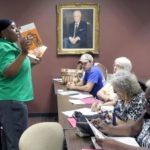 This Act Locally Waco blog post was written by Meilana Charles. Meilana is a Family and Consumer Sciences Extension Agent at Cooperative Extension Program at Prairie View A&M University. Meilana’s priority areas for providing educational resources to McLennan County are general nutrition, money management and parenting. She has a M.S. in Child Development from Texas Woman’s University and is a certified Human Development and Family Studies professional through American Association of Family and Consumer Sciences.
This Act Locally Waco blog post was written by Meilana Charles. Meilana is a Family and Consumer Sciences Extension Agent at Cooperative Extension Program at Prairie View A&M University. Meilana’s priority areas for providing educational resources to McLennan County are general nutrition, money management and parenting. She has a M.S. in Child Development from Texas Woman’s University and is a certified Human Development and Family Studies professional through American Association of Family and Consumer Sciences.
The Act Locally Waco blog publishes posts with a connection to these aspirations for Waco. If you are interested in writing for the Act Locally Waco Blog, please email [email protected] for more information.
By Alexis Christensen
I’ve long been drawn to understanding how governmental systems work—whether it’s politics, civic engagement or policy. Often we think about law or policies from an impersonal perspective, but in reality, they can be very personal.
In Part One of this series we learned about the devastating effects payday and auto title lending has on our residents and our city. Because of the negative outcomes produced by these loans, many believe now is the time for action. In the world of community development, the grassroots movement becomes effective in creating change when community members who have experienced, dealt with or struggled through the situation voice their personal stories and ideas into the work.
So let us turn to the voices of the community, who have dealt with the negative effects of payday and auto title lending firsthand. For a moment, let us listen to the voices of experience.
Ms. Lewis, tell us your story.
Lewis: I am a single parent of two kids. My son is 17 years old and chronically ill and I have a 19 year old daughter in college. I got into desperate times and needed money due to my financial situation. I have to travel a lot with my son [to visit doctors]. He requires medicines through IV and has frequent doctor visits. Then I found out my daughter had medical issues too. I kept seeing all these ads and signs, so I went and got an auto title loan.
Christensen: How was that visit?
Lewis: Well, when I got the loan they made me feel so comfortable and they were so friendly but come to find out they were wolves in sheep’s clothing. As a single parent, I am stressed. I am trying to keep up with the bills and sometimes it’s hard but I do what I can to manage. When it comes to payday lenders, yes they are so nice and sweet when you first come through the door but…I wish I had never done it because of the outrageous fees they charge with interest and the harassing calls…When my son was in the hospital, they called me just about every day threatening to come and take my car, it was awful.
Unfortunately, Ms. Lewis is not alone in her experiences with payday and auto title lending. Let’s hear from Mr. Thomas, who is a veteran.
Mr. Thomas, tell us your story.
Thomas: I was in school and temporarily unemployed and took out both an auto title loan and a payday loan to catch up on my water and electric bills and pay for school. I actually got a job in the same week I took out the auto title loan, but couldn’t keep up with the loan payments and had my pickup repossessed. The original loan was for $1,000 and the auto title loan was for $4,000. I’ve been charged twice the amount of the original loans.
I’ll be paying these type of loans off forever because of the interest. There is no way to catch up. Me and my wife are currently trying to adopt our nieces and credit issues have come up as an issue [in the adoption process].
Lastly, let’s hear from Ms. Marks.
Marks: A long while ago I got an auto title loan for $500 and ended up paying $2400 on the whole thing. Loan interest rate was about 800%. I belonged to a credit union and explained situation and they bought out the auto title and payday loan.
It was so hard to get a loan anywhere else besides a payday loan place. The stores keep calling and asking about getting another loan. At [a local payday loan store] I got a loan for $150 and I’m on the way right now to pay $51 in fees today to extend it for two weeks and it won’t go toward principal. I have 6 months to pay it in full.
If I could change anything about them, lower the interest rate. They get away with it [high interest rates] because they say they’re not the lender and they can’t do anything about it.
These stories have come from people right here in our community. These brave ones have shared some of their most vulnerable moments with us to help see change happen at the local level. This is why the ordinance to help address the issues payday and auto title lending create is vitally important to our community. The ordinance is one part of the solution; we also need sound alternatives and education to see true systemic change. Find where you fit in this work and help create a flourishing Waco for all of us.
*Some names have been changed to protect the identity of the community members.
 Alexis Christensen is a Community Organizer at Waco Community Development Corporation (Waco CDC).
Alexis Christensen is a Community Organizer at Waco Community Development Corporation (Waco CDC).
by Jenuine Poetess
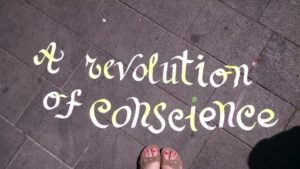
(photo curtesy: JenuineArtworks. Salerno, Italy :: 100Thousand Artists for Change Global Conference, June 2015)
One of the oldest motivations of creativity is as a response to political circumstances and social justice issues. It is not the only inspiration, by any means, and not all artists engage their discipline in this way. Within the context of the mission and vision of Act Locally Waco the Arts & Culture blog seeks to present artists, events, and organizations which are practicing the intersectionality of creative expression, meaningful message, and local action.
On December 4, 2015, over 65 people showed up to offer poems, prayers, statements, songs, sacred texts, and calls to action. Waco gathered in response to global and domestic terrorism and violence; speaking out against hate, racism, discrimination of every kind, ignorance, and intolerance — with the intention of co-authoring an alternative narrative to our current dire situation.
That evening, our community co-created an exquisite artwork with Hopi prayers and Gospel songs, Athiest Holiday carols and passages of the Qur’an, original poetry and Bible verses, impromptu words from the heart and spoken-words of others not with us. One thing brought us together: the earnest desire to build a better city, a better community, a better world, for one another, in peace, in love, in truth, for justice.
we gather, because there are people rallying for hate, acting in violence, speaking out with ignorance.
we gather, because we must co-author an alternative narrative for our community, our society, our humanity.
we gather, because to remain unmoved, silent, disconnected, is to surrender to everything that threatens our thriving.
we gather, because anything less is a hypocrisy of love.
What an honor it is to hold such a sacred space.
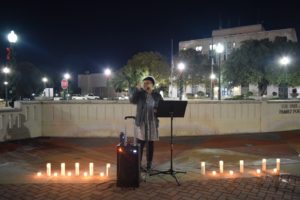 In times when the world seems swirling and chaotic around us, it helps to know we can gather with others to express the spectrum of emotions that such profound events can elicit. When words fail us we can turn to paint, music, dance, photography, sculpture, and any other medium that calls to us. We can work out our questions, knowing full well that there are often no answers. But with defiant resilience, we can make beautiful out of broken, and when we share what we have created, we remind ourselves and each other that we are not alone. Poem by poem, song by song, painting by painting we create the change we so deeply long for.
In times when the world seems swirling and chaotic around us, it helps to know we can gather with others to express the spectrum of emotions that such profound events can elicit. When words fail us we can turn to paint, music, dance, photography, sculpture, and any other medium that calls to us. We can work out our questions, knowing full well that there are often no answers. But with defiant resilience, we can make beautiful out of broken, and when we share what we have created, we remind ourselves and each other that we are not alone. Poem by poem, song by song, painting by painting we create the change we so deeply long for.
Get Involved:
Shop local and support artists living and creating in Central Texas
- Anthem Studio & Gallery
- Creative Waco
- Waco WonderLand
- Central’s Market Artist Fair (December 12th)
- Waco Downtown Farmer’s Market (Artist Markets: December 12th & 19th)
- Blow-Your-Own-Glass-Ornament @ Stanton Studios :: Fridays & Saturdays in December
Volunteer with an arts organization or collective
 Jenuine Poetess is an artist, visionary, and community organizer. In 2010, she founded In the Words of Womyn (ITWOW), an international, grass-roots, written and spoken-word arts project with chapters throughout Los Angeles, CA; Waco, TX; and Lebanon. Jenuine is the founder of Waco Poets Society and co-founder of the Central Texas Artist Collective. She writes, organizes, and creates rooted in the fierce conviction that holding intentional space, access, and opportunity for all people to foster their creative health is a matter of justice and is a vital asset to the sustainable thriving of communities. She currently lives and poems in Central Texas where she enjoys finding new ways to disrupt the homeostasis of her city. You can contact her at: j[email protected].
Jenuine Poetess is an artist, visionary, and community organizer. In 2010, she founded In the Words of Womyn (ITWOW), an international, grass-roots, written and spoken-word arts project with chapters throughout Los Angeles, CA; Waco, TX; and Lebanon. Jenuine is the founder of Waco Poets Society and co-founder of the Central Texas Artist Collective. She writes, organizes, and creates rooted in the fierce conviction that holding intentional space, access, and opportunity for all people to foster their creative health is a matter of justice and is a vital asset to the sustainable thriving of communities. She currently lives and poems in Central Texas where she enjoys finding new ways to disrupt the homeostasis of her city. You can contact her at: j[email protected].
The Act Locally Waco blog publishes posts with a connection to these aspirations for Waco. If you are interested in writing for the Act Locally Waco Blog, please email [email protected] for more information.
By Dillon Meek
There has been a lot of talk lately (at least in my world) about payday and auto title loans and how our community should respond to the presence of this industry in our community (assuming there should be a response at all). This is the first post, in a series of posts, to address the topic of payday lending in Waco, Texas.
Other posts that will follow this one will include discussions on alternatives to payday lending that are available to borrowers, laws regulating payday lending (including the option for a local ordinance), and personal stories from people in our community who have been effected by payday lending.
But first, let’s look at what payday lending is, why it’s a problem and why we as a community need to respond.
Let’s Start at the Beginning: What is a Payday Loan?
Payday and auto title loans are high cost, small-dollar loans. They are offered with little-to-no consideration for a borrower’s ability to repay. Payday loans require proof of employment and access to a bank account via a post-dated check or electronic ACH authorization. The initial term is typically two weeks – until after the next paycheck. Auto title loans are secured by a car title; the amount loaned is based on the value of the car and they have terms of thirty days. They are both marketed on the basis of speed and convenience to people.
So What’s the Problem with Payday Loans?
Most payday loans are predatory. While there are no legal definitions in the United States for predatory lending, an audit report on predatory lending from the office of inspector general of the FDIC broadly defines predatory lending as “imposing unfair and abusive loan terms on borrowers.” Here are some signs that a payday loan is predatory:
- Triple digit interest rate. Payday loans carry very low risk of loss, but payday lenders here in Waco typically charge fees equal to 400% – 500% APR.
- Unlike when a bank issues a loan, predatory lenders do not consider a borrower’s ability to repay. Payday lenders allow (and often encourage) consumers to borrow the maximum allowed, regardless of their credit history, wages, or ability to repay. If the borrower can’t repay the loan, the lender collects multiple renewal fees and makes more money. In other words, the more unsuccessful the borrower is, the more successful the lender is.
- Loan flipping (extensions, rollovers or back to back transactions). Payday lenders earn most of their profits by making multiple loans to cash-strapped borrowers. 90% of the payday industry’s revenue growth comes from making more and larger loans to the same customers. Often times this leads to a cycle of debt.
How is Waco Affected?
- $10.5 million is drained from the Waco economy annually as a result of these institutions.
- There are 36 storefronts in Waco, Texas. None are locally owned.
- On average, 12 cars are repossessed each week by auto title lenders.
- 3 out of 5 payday loans in Waco are to borrowers who pay more in interest than they do in principal.
Source: Texas Appleseed analysis of Texas Office of Consumer Credit Commissioner 2012 and 2013 Credit Access Business Quarterly and Annual Data Reports. Store location data is based on the Office of Consumer Credit Commissioner CAB licensing data for August 2014.
How Do We Respond?
A local Waco group, Citizens for Responsible Lending, is advocating and working hard for (1) the community to develop alternatives to payday loans, (2) education and awareness in the community regarding this issue, and (3) the city council to pass an ordinance regulating payday lending in Waco if the state and federal legislatures will not. Because Texas law does not prohibit predatory lending practices, 26 cities in Texas have passed a uniform ordinance. The other posts in this series will address each of these responses in more detail.
What I know is this: predatory lending is happening in Waco, Texas, and in order for our community to become financially secure, we need to engage a discussion about how we are going to prohibit our citizens from being exploited by this industry. You can participate in this discussion this Tuesday, December 8, at 6 pm at the City of Waco Operations Center at 1415 N 4th St.
 Dillon Meek serves on the Waco City and is general counsel for a local investment company. Prior to that he served as an associate attorney at Haley Olson, PC, where he represented local governments, financial institutions, and energy companies. He is engaged to Lindsey Myers, a Waco ISD school teacher. You can contact him at [email protected].
Dillon Meek serves on the Waco City and is general counsel for a local investment company. Prior to that he served as an associate attorney at Haley Olson, PC, where he represented local governments, financial institutions, and energy companies. He is engaged to Lindsey Myers, a Waco ISD school teacher. You can contact him at [email protected].
The Act Locally Waco blog publishes posts with a connection to these aspirations for Waco. If you are interested in writing for the Act Locally Waco Blog, please email [email protected] for more information.
By Matthew Polk
Last Tuesday, we had the opportunity to have dinner and conversation with community members in East Waco about how they would achieve the Prosper Waco goals in their community. The Prosper Waco community engagement council and the Northeast Riverside Neighborhood Association partnered to bring the Prosper Waco dialogue to East Waco. Some two dozen local residents came out to chew on ideas developed by the Prosper Waco steering committees for achieving the our community’s goals to improve the education, health, and financial security of Wacoans.
There is much to say about our community, both its strengths and challenges. To focus the conversation, members of the Prosper Waco community engagement council guided the conversation with questions focused on three specific initiative efforts:
- Preparing all children to be successful in Kindergarten by engaging parents in their child’s early education and connecting them to resources like high-quality childcare
- Developing a community health worker program to train community members on health issues and empower them to work with their family, friends, and neighbors to better access the healthcare available in our community
- Making new job training opportunities available, including full-time training courses that last just a few weeks and programs specifically designed for youth (16-24 year olds)
There is no “one size fits all” community program—different neighborhoods, even different families, face different challenges and need different things. Whether the programs listed above will work and how they can work best are things that each neighborhood has to decide for itself.
This Wednesday night (December 9) , the community conversation will move to South Waco (Maranatha Church at 2200 Ross Ave.) at 6:00pm. If you live in South Waco, please be part of this event! You do not need to reserve a spot, just come have dinner and be part of the discussion. And if you live in North Waco, join us on Thursday night (December 10) at 6:00pm at Greater New Light Missionary Baptist Church (925 N. 18th St.). At both events, we’ll be focusing on the three topics listed above, but there will be plenty of opportunity to provide thoughts and ideas on other issues that the Prosper Waco initiative is working on.
We know that Wacoans (and especially Act Locally Waco readers!) care about Waco. Even if you can’t attend community meetings, we want to make it as easy as possible for you to stay informed on the Prosper Waco initiative and be part of the conversation about how our community is doing on the most important issues: education, health, and financial security for all members of our community. If you have ideas about what it takes to improve education, health, and financial security in your community, don’t hesitate to reach out. In fact, you can use our new community engagement email address: [email protected]!
Send an email to us at this address and you’ll get a reply either from a Prosper Waco staffer or a member of the Prosper Waco community engagement council—a community member who lives in your neck of the woods. Either way, every comment and idea is important and helps guide where this community initiative goes!
 This Act Locally Waco Blog post was written by Matthew Polk. Matthew is Executive Director of Prosper Waco. Prior to that, he served as Superintendent of Rapoport Academy Public School. He and his wife attended Baylor, and after spending a few years in the northeast, they returned to Waco to raise their family. They have four children, ages 8 to 3 months. You can contact him at [email protected].
This Act Locally Waco Blog post was written by Matthew Polk. Matthew is Executive Director of Prosper Waco. Prior to that, he served as Superintendent of Rapoport Academy Public School. He and his wife attended Baylor, and after spending a few years in the northeast, they returned to Waco to raise their family. They have four children, ages 8 to 3 months. You can contact him at [email protected].
The Act Locally Waco blog publishes posts with a connection to these aspirations for Waco. If you are interested in writing for the Act Locally Waco Blog, please email [email protected] for more information.
By Kaylah Johnson
In just 4 months of employment, I have fallen in love with Goodwill. When most individuals think of Goodwill, they think of retail stores or maybe they find themselves humming Macklemore’s song Thrift Shop. While our retail stores are well known for their bargains, it’s our Mission Services efforts that really give me the warm fuzzies. Specifically, it’s the Careers in Retail program that gives me a sense of fulfillment and allows me to achieve my personal mission of stimulating growth in my community by providing encouragement, guidance, and education to the individuals and organizations that reside within it.
Now here is the textbook description of Careers in Retail…
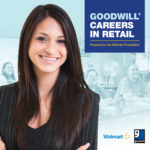 “Careers in Retail (CiR) is a no-cost program that prepares entry-level employees to move up to rewarding, higher-paying jobs and lasting careers in the retail, restaurant, and hospitality industries. This is achieved through remedial, soft skills, and occupational training that equips our clients with the necessary tools to turn their entry-level jobs into mid-level careers. This initiative is funded by the Walmart Foundation and executed by 8 select Goodwill’s throughout the U.S. This initiative is built upon Heart of Texas Goodwill’s 60 years of successful job training programs in our community.”
“Careers in Retail (CiR) is a no-cost program that prepares entry-level employees to move up to rewarding, higher-paying jobs and lasting careers in the retail, restaurant, and hospitality industries. This is achieved through remedial, soft skills, and occupational training that equips our clients with the necessary tools to turn their entry-level jobs into mid-level careers. This initiative is funded by the Walmart Foundation and executed by 8 select Goodwill’s throughout the U.S. This initiative is built upon Heart of Texas Goodwill’s 60 years of successful job training programs in our community.”
Now here is the truth…
Careers in Retail is unique to this community. It’s one of the most job placement intensive initiatives that I’ve encountered in my 15 year stay in Central Texas. The whole idea behind it is to help people see their potential for being successful and prepare them to step into greater roles in the restaurant, retail and hospitality industries. According to the most recent U.S Census, just over 30% of the Waco community lives in poverty. Many of those people are working jobs for $7.25 an hour in the restaurant, retail and hospitality industries – which equals about $15,000 in annual income before taxes. Surprisingly, these wages aren’t just affecting one age range. The chart below shows the age ranges of our current CiR participants:
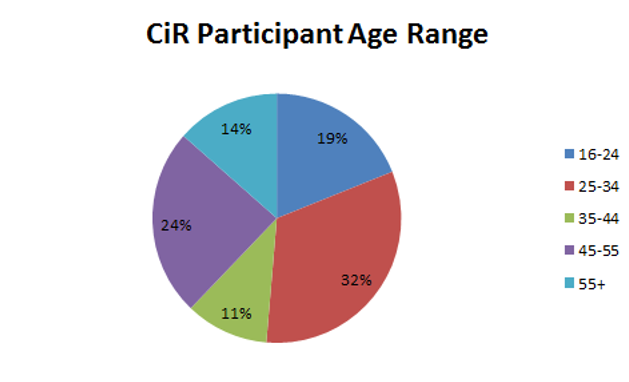 Additionally, our current participants come from a variety of racial and ethnic backgrounds. So what does this mean? In short, it means that ALL of this community needs the Careers in Retail program. There are some great jobs available in retail, restaurant, and hospitality, but not a large pool of qualified applicants. Our focus is to bridge that skills gap and move people into mid-level positions by providing them with the training and skills needed to be successful. Now that we’ve covered the what and the why, let’s talk about the how.
Additionally, our current participants come from a variety of racial and ethnic backgrounds. So what does this mean? In short, it means that ALL of this community needs the Careers in Retail program. There are some great jobs available in retail, restaurant, and hospitality, but not a large pool of qualified applicants. Our focus is to bridge that skills gap and move people into mid-level positions by providing them with the training and skills needed to be successful. Now that we’ve covered the what and the why, let’s talk about the how.
It all begins with an application. CiR applications can be picked up from any of the four Goodwill Learning Centers (Killeen, Belton, Temple, or Waco) or found online on the Heart of Texas Goodwill website. Applications are then reviewed by CiR Specialists. Next we perform interviews and assessments for applicants to ensure that they are a good fit for the program. We look for motivated self-starters with industry background who have an immediate desire to move into a better position in retail, restaurant, or hospitality. Once accepted into the program, participants receive individualized skills training. Maybe they need a refresher using Microsoft Excel or they need some help with their interview skills? Either way, we provide that training to help them improve.
The highlight of this program is the training that we provide through the National Retail Federation (NRF). There are 3 major certifications provided through NRF: (1) Customer Service and Sales, (2) Advanced Customer Service and Sales, and (3) Retail Management. We require all participants to complete the Customer Service Essentials course. This course provides detailed training on the do’s and don’ts of customer service while incorporating curriculum that assists with passing the Customer Service and Sales certification exam through NRF. Passing this course and the certification exam gives people the opportunity to add something new to their resume and develop the exceptional customer service skills that are needed to stand out with employers. The other two courses are optional and are assigned based on specific needs identified for each individual participant.
Once the participant has completed all of the skills training, we get them job ready! In collaboration with our Goodwill Learning Centers, we provide services for resume writing, cover letter writing, interview skills, job search & networking techniques, self-presentation, and much more. We also work with local employers to help place our participants into mid-level positions.
All of the services listed above are provided at no cost to our CiR participants so there is much more to gain than there is to lose. Our goal is to place over 100 people from this community into new careers in retail, restaurant, or hospitality. If you or someone you know may benefit from this program, please feel free to contact me: Kaylah Johnson, Program Manager for Careers in Retail at (254) 495-9415 or [email protected].
 Kaylah Johnson is a business major with the heart of a social worker. She has won two awards for her dedicated volunteer work in Central Texas and continues to volunteer her time to a variety of local causes. She is currently set to graduate with her MBA with a concentration in Management & Leadership from Texas A&M University – Central Texas in May 2016. Her motto is “I don’t know everything but I can learn anything” so in her spare time aside from spending time with family, Kaylah likes to read and watch anything that will broaden her skill set.
Kaylah Johnson is a business major with the heart of a social worker. She has won two awards for her dedicated volunteer work in Central Texas and continues to volunteer her time to a variety of local causes. She is currently set to graduate with her MBA with a concentration in Management & Leadership from Texas A&M University – Central Texas in May 2016. Her motto is “I don’t know everything but I can learn anything” so in her spare time aside from spending time with family, Kaylah likes to read and watch anything that will broaden her skill set.
The Act Locally Waco blog publishes posts with a connection to these aspirations for Waco. If you are interested in writing for the Act Locally Waco Blog, please email [email protected] for more information.
by Courtney Restivo Wollard
The City of Waco is preparing to be designated as a Smoke Free City in January. As an advocate for health, I felt it was time to discuss this ordinance and the positive impact it will have on our city and its residents.
 First of all, smoke free laws are not a new concept. In fact, as of July 2015, twenty-six states and 763 municipalities in the U.S. have placed bans on smoking in restaurants and bars as well as non-hospitality workplaces. These laws are being implemented all over the country and all over the world. Ninety-two nations have enacted some sort of 100% smoke free law, sixty-two of those laws include both restaurants and bars. On October 1, 2015, it became illegal to smoke in vehicles with those under the age of 18 in England and Wales. The Texas statewide ban has stalled, but numerous cities in Texas are taking action and enacting their own smoking bans including Robinson, Woodway and soon Waco.
First of all, smoke free laws are not a new concept. In fact, as of July 2015, twenty-six states and 763 municipalities in the U.S. have placed bans on smoking in restaurants and bars as well as non-hospitality workplaces. These laws are being implemented all over the country and all over the world. Ninety-two nations have enacted some sort of 100% smoke free law, sixty-two of those laws include both restaurants and bars. On October 1, 2015, it became illegal to smoke in vehicles with those under the age of 18 in England and Wales. The Texas statewide ban has stalled, but numerous cities in Texas are taking action and enacting their own smoking bans including Robinson, Woodway and soon Waco.
Do you remember when it was legal to smoke on airplanes? I’m a little too young to remember that, but I do notice the ‘No Smoking’ signs on airplanes today and know the history. It has been 25 years since smoking was banned on airplanes and now there is an entire generation that could not even imagine smoking on an airplane. That’s a huge accomplishment for public health! The City of Waco smoke free ordinance will contribute to another generation not knowing what it was like for smoking to be allowed in indoor workplaces, including restaurants and bars along with bingo and pool halls.
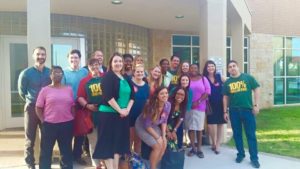 Second, it is a known fact that secondhand smoke causes disease and premature death for nonsmokers. Countless studies published by leading health agencies have affirmed that secondhand smoke is a completely preventable cause of death. According to the 2006 U.S. Surgeon General, there is “no safe level of secondhand smoke exposure and the only way to ensure health protection is a 100% smoke free environment.”
Second, it is a known fact that secondhand smoke causes disease and premature death for nonsmokers. Countless studies published by leading health agencies have affirmed that secondhand smoke is a completely preventable cause of death. According to the 2006 U.S. Surgeon General, there is “no safe level of secondhand smoke exposure and the only way to ensure health protection is a 100% smoke free environment.”
Smoke Free laws are designed to protect the public health and welfare of the community from health hazards such as heart disease, various cancers, stroke, and respiratory infections induced by breathing in secondhand smoke.
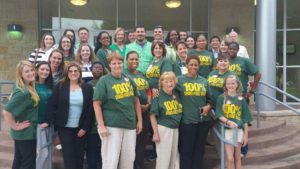 There are several health benefits that we should see with this new smoke free ordinance. The ordinance will reduce exposure to secondhand smoke and produce a drop in ER visits due to heart and asthma related issues. Heart disease is the leading cause of death in the nation for men and women. Smoke free environments have been shown to decrease the rate of heart disease. Smoke free laws move us in the right direction – hopefully soon heart disease will no longer being the number one killer of Americans. These laws will also encourage people to quit smoking and prevent youth from starting to smoke; this will ultimately reduce the number of smoking related deaths.
There are several health benefits that we should see with this new smoke free ordinance. The ordinance will reduce exposure to secondhand smoke and produce a drop in ER visits due to heart and asthma related issues. Heart disease is the leading cause of death in the nation for men and women. Smoke free environments have been shown to decrease the rate of heart disease. Smoke free laws move us in the right direction – hopefully soon heart disease will no longer being the number one killer of Americans. These laws will also encourage people to quit smoking and prevent youth from starting to smoke; this will ultimately reduce the number of smoking related deaths.
Essentially, our community will be healthier, happier and will continue to prosper after this ordinance goes into effect.
I am very excited to soon be living in a designated smoke free city! I applaud the City of Waco for taking this step towards protecting the health of its residents in order to have a prosperous Waco!
 Courtney Restivo Wollard is a lifelong Waco resident who works as Lead Health Services Coordinator at the Waco-McLennan County Public Health District. She serves as Chair for the Live Well Waco/Obesity Working Group of the Prosper Waco Health Committee. She is also an alumnus of the Waco Foundation LeadershipPLENTY Institute. Courtney graduated with her Masters of Public Health from Baylor University and right away began her career as a health advocate. She is married to Kyle. They have a Chihuahua and a Labrador retriever and are in the midst of building their dream home. Courtney hopes to continue to help create a healthier environment for McLennan County residents filled with healthy eating and physical activity opportunities.
Courtney Restivo Wollard is a lifelong Waco resident who works as Lead Health Services Coordinator at the Waco-McLennan County Public Health District. She serves as Chair for the Live Well Waco/Obesity Working Group of the Prosper Waco Health Committee. She is also an alumnus of the Waco Foundation LeadershipPLENTY Institute. Courtney graduated with her Masters of Public Health from Baylor University and right away began her career as a health advocate. She is married to Kyle. They have a Chihuahua and a Labrador retriever and are in the midst of building their dream home. Courtney hopes to continue to help create a healthier environment for McLennan County residents filled with healthy eating and physical activity opportunities.
The Act Locally Waco blog publishes posts with a connection to these aspirations for Waco. If you are interested in writing for the Act Locally Waco Blog, please email [email protected] for more information.
References:
U.S. smoking bans –
World smoking bans –
- http://www.no-smoke.org/pdf/internationalbarsandrestaurants.pdf
- http://www.bbc.com/news/world-11845158
Smoking ban in vehicles in England/Wales –
- https://www.gov.uk/government/publications/new-rules-about-tobacco-e-cigarettes-and-smoking-1-october-2015/new-rules-about-tobacco-e-cigarettes-and-smoking-1-october-2015
- http://www.inquisitr.com/2342320/smoking-in-cars-with-children-illegal-starting-october-1st-2015/
Smoking ban on airplanes –
Benefits –
- http://www.cdc.gov/tobacco/data_statistics/fact_sheets/secondhand_smoke/protection/improve_health/
- http://www.acscan.org/pdf/tobacco/reports/acscan-smoke-free-laws-report.pdf

